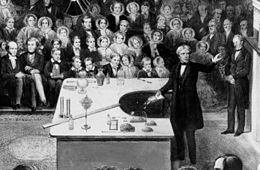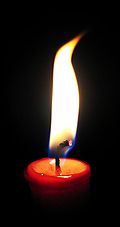- Royal Institution Christmas Lectures
-
The Royal Institution Christmas Lectures are a series of lectures on a single topic, which have been held at the Royal Institution in London each year since 1825. The lectures present scientific subjects to a general audience, including young people, in an informative and entertaining manner. Michael Faraday initiated the first Christmas Lecture series in 1825. This came at a time when organised education for young people was scarce. Faraday presented a total of nineteen series in all.[1]
The Christmas Lectures have continued annually since 1825, interrupted only during the Second World War. Scientists who have delivered lectures include Baroness Susan Greenfield (former Director of the Royal Institution),[2] naturalist Sir David Attenborough, astronomer Carl Sagan, biologist Richard Dawkins and Nobel Laureate George Porter.[1]
Contents
Television
The lectures have been televised since 1966.[1] They were broadcast on BBC Two from 1966–1999, Channel 4 from 2000–2004, Channel Five from 2005–2008 and More4 in 2009. The 2010 lectures were broadcast on BBC Four on Tuesday 28 December, Wednesday 29 December and Thursday 30 December at 8 pm.[3]
List of Christmas Lectures
The following is a complete list of the Christmas Lectures as of December 2010[update]:[4]
Year Lecturer(s) Title of series 1825 John Millington Natural Philosophy 1826 J. Wallis Astronomy 1827 Michael Faraday Chemistry 1828 J. Wood Architecture 1829 Michael Faraday Electricity 1830 Thomas Webster Geology 1831 James Rennie Zoology 1832 Michael Faraday Chemistry 1833 John Lindley Botany 1834 William Thomas Brande Chemistry 1835 Michael Faraday Electricity 1836 William Thomas Brande Chemistry of the Gases 1837 Michael Faraday Chemistry 1838 J. Wallis Astronomy 1839 William Thomas Brande The Chemistry of the Atmosphere and the Ocean 1840 John Frederic Daniell The First Principles of Franklinic Electricity 1841 Michael Faraday The Rudiments of Chemistry 1842 William Thomas Brande The Chemistry of the Non-Metallic Elements 1843 Michael Faraday First Principles of Electricity 1844 William Thomas Brande The Chemistry of the Gases 1845 Michael Faraday The Rudiments of Chemistry 1846 J. Wallis The Rudiments of Astronomy 1847 William Thomas Brande The Elements of Organic Chemistry 1848 Michael Faraday The Chemical History of a Candle 1849 Robert Walker The Properties of Matter and the Laws of Motion 1850 William Thomas Brande The Chemistry of Coal 1851 Michael Faraday Attractive Forces 1852 Michael Faraday Chemistry 1853 Michael Faraday Voltaic Electricity 1854 Michael Faraday The Chemistry of Combustion 1855 Michael Faraday The Distinctive Properties of the Common Metals 1856 Michael Faraday Attractive Forces 1857 Michael Faraday Static Electricity 1858 Michael Faraday The Metallic Properties 1859 Michael Faraday The Various Forces of Matter and their Relations to Each Other 1860 Michael Faraday The Chemical History of a Candle 1861 John Tyndall Light 1862 Edward Frankland Air and Water 1863 John Tyndall Electricity at Rest and Electricity in Motion 1864 Edward Frankland The Chemistry of a Coal 1865 John Tyndall Sound 1866 Edward Frankland The Chemistry of Gases 1867 John Tyndall Heat and Cold 1868 William Odling The Chemical Changes of Carbon 1869 John Tyndall Light 1870 William Odling Burning and Unburning 1871 John Tyndall Ice, Water, Vapour and Air 1872 William Odling Air and Gas 1873 John Tyndall The Motion and Sensation of Sound 1874 John Hall Gladstone The Voltaic Battery 1875 John Tyndall Experimental Electricity 1876 John Hall Gladstone The Chemistry of Fire 1877 John Tyndall Heat, Visible and Invisible 1878 James Dewar A Soap Bubble 1879 John Tyndall Water and Air 1880 James Dewar Atoms 1881 Robert Stawell Ball The Sun, the Moon and the Planets 1882 John Tyndall Light and the Eye 1883 James Dewar Alchemy in Relation to Modern Science 1884 John Tyndall The Sources of Electricity 1885 James Dewar The Story of a Meteorite 1886 James Dewar The Chemistry of Light and Photography 1887 Robert Stawell Ball Astronomy 1888 James Dewar Clouds and Cloudland 1889 Arthur Rücker Electricity 1890 James Dewar Frost and Fire 1891 John Gray McKendrick Life in Motion; or the Animal Machine 1892 Robert Stawell Ball Astronomy 1893 James Dewar Air: Gaseous and Liquid 1894 John Ambrose Fleming The Work of an Electric Current 1895 John Gray McKendrick Sound, Hearing and Speech 1896 Sylvanus Phillips Thompson Light, Visible and Invisible 1897 Oliver Lodge The Principles of the Electric Telegraph 1898 Robert Stawell Ball Astronomy 1899 Charles Vernon Boys Fluids in Motion and at Rest 1900 Robert Stawell Ball Great Chapters from the Book of Nature 1901 John Ambrose Fleming Waves and Ripples in Water, Air and Aether 1902 Henry Selby Hele-Shaw Locomotion : On the Earth, Through the Water, in the Air 1903 Edwin Ray Lankester Extinct Animals 1904 Henry Cunynghame Ancient and Modern Methods of Measuring Time 1905 Herbert Hall Turner Astronomy 1906 William Duddell Signalling to a Distance 1907 David Gill Astronomy, Old and New 1908 W. Stirling The Wheel of Life 1909 William Duddell Modern Electricity 1910 Sylvanus Phillips Thompson Sound: Musical and Non-Musical 1911 Peter Chalmers Mitchell The Childhood of Animals 1912 James Dewar Christmas Lecture Epilogues 1913 Herbert Hall Turner A Voyage in Space 1914 Charles Vernon Boys Science in the Home 1915 Herbert Hall Turner Wireless Messages from the Stars 1916 A. Keith The Human Machine Which All Must Work 1917 John Ambrose Fleming Our Useful Servants : Magnetism and Electricity 1918 D'Arcy Wentworth Thompson The Fish of the Sea 1919 William Henry Bragg The World of Sound 1920 John Arthur Thomson The Haunts of Life 1921 John Ambrose Fleming Electric Waves and Wireless Telephony 1922 Herbert Hall Turner Six Steps Up the Ladder to the Stars 1923 William Henry Bragg Concerning the Nature of Things 1924 F. Balfour Browne Concerning the Habits of Insects 1925 William Henry Bragg Old Trades and New Knowledge 1926 Archibald Vivian Hill Nerves and Muscles: How We Feel and Move 1927 Edward Andrade Engines 1928 A. Wood Sound Waves and their Uses 1929 Stephen Glanville How Things Were Done in Ancient Egypt 1930 A.M. Tyndall The Electric Spark 1931 William Lawrence Bragg The Universe of Light 1932 Alexander Oliver Rankine The Round of the Waters 1933 James Hopwood Jeans Through Space and Time 1934 William Lawrence Bragg Electricity 1935 C.E.K. Mees Photography 1936 G.I. Taylor Ships 1937 Julian Huxley Rare Animals and the Disappearance of Wild Life 1938 James Kendall Young Chemists and Great Discoveries 1939–1942 No lectures due to the Second World War 1943 Edward Andrade Vibrations and Waves 1944 Harold Spencer Jones Astronomy in our Daily Life 1945 Robert Watson-Watt Wireless 1946 H. Hartridge Colours and How We See Them 1947 Eric K. Rideal Chemical Reactions: How They Work 1948 Frederic Bartlett The Mind at Work and Play 1949 Percy Dunsheath The Electric Current 1950 Edward Andrade Waves and Vibrations 1951 James Gray How Animals Move 1952 F. Sherwood Taylor How Science Has Grown 1953 J.A. Ratcliffe The Uses of Radio Waves 1954 Frank Whittle The Story of Petroleum 1955 Harry W. Melville Big Molecules 1956 H. Baines Photography 1957 J. Huxley and J. Fisher Birds 1958 J.A. Ratcliffe, J.M. Stagg,
R.L.F. Boyd,
Graham Sutton,
G.E.R. Deacon,
G. de Q. RobinThe International Geophysical Year 1959 Thomas Allibone The Release and Use of Atomic Energy 1960 V.E. Cosslett Seeing the Very Small 1961 William Lawrence Bragg Electricity 1962 R.E.D. Bishop Vibration 1963 Ronald King Energy 1964 Desmond Morris Animal Behaviour 1965 Bernard Lovell, Francis Smith,
Martin Ryle, Antony HewishExploration of the Universe 1966 Eric Laithwaite The Engineer in Wonderland 1967 Richard L. Gregory The Intelligent Eye 1968 P. Morrison Gulliver's Laws: The Physics of Large and Small 1969 George Porter Time Machines 1970 John Napier Monkeys Without Tails: A Giraffe's Eye-view of Man 1971 Charles Taylor Sounds of Music: the Science of Tones and Tune 1972 G.G. Gouriet Ripples in the Ether: The Science of Radio Communication 1973 David Attenborough The Language of Animals 1974 Eric Laithwaite The Engineer Through the Looking Glass 1975 Heinz Wolff Signals from the Interior 1976 George Porter The Natural History of a Sunbeam 1977 Carl Sagan The Planets 1978 Erik Christopher Zeeman Mathematics into Pictures 1979 E.M. Rogers Atoms for Engineering Minds: A Circus of Experiments 1980 David Chilton Phillips
with Max Perutz in Lecture 5The Chicken, the Egg and the Molecules 1981 Reginald Victor Jones From Magna Carta to Microchip 1982 Colin Blakemore Common Sense 1983 Leonard Maunder Machines in Motion 1984 Walter Bodmer The Message of the Genes 1985 John David Pye Communicating 1986 Lewis Wolpert Frankenstein's Quest: Development of Life 1987 John Meurig Thomas and David Phillips Crystals and Lasers 1988 Gareth Roberts The Home of the Future 1989 Charles Taylor Exploring Music 1990 Malcolm Longair Origins 1991 Richard Dawkins Growing Up in the Universe 1992 Charles J.M. Stirling[5] Our World Through the Looking Glass 1993 Frank Close The Cosmic Onion 1994 Susan Greenfield Journey to the Centre of the Brain 1995 James Jackson Planet Earth, An Explorer's guide 1996 Simon Conway Morris The History in our Bones 1997 Ian Stewart The Magical Maze 1998 Nancy Rothwell Staying Alive 1999 Neil F. Johnson Arrows of Time 2000 Kevin Warwick Rise of the Robots 2001 John Sulston The Secrets of Life 2002 Tony Ryan Smart Stuff 2003 Monica Grady Voyage in Space and Time 2004 Lloyd Peck To the End of the Earth: Surviving Antarctic Extremes 2005 John Krebs The Truth About Food 2006 Marcus du Sautoy The Num8er My5teries 2007 Hugh Montgomery Back from the Brink: The Science of Survival 2008 Christopher Bishop Hi-tech Trek[6]
2009 Sue Hartley The 300-Million-Year War 2010 Mark Miodownik Size Matters[7] 2011 Bruce Hood Meet Your Brain References
- ^ a b c Royal Institution (2008). "History of the RI Christmas Lectures". Retrieved December 22, 2009.
- ^ BBC (2010-01-09). "Royal Institution former chief suing for discrimination". BBC. http://news.bbc.co.uk/1/hi/sci/tech/8449718.stm. Retrieved 9 January 2010.
- ^ Network TV BBC Weeks 51/52. Retrieved December 4, 2010.
- ^ Royal Institution (2007). "List of Lecturers". Retrieved December 28, 2010.
- ^ [1]
- ^ Revisit the Hi-tech Trek � The 2008 Christmas Lectures ". Retrieved December 22, 2009.
- ^ 2010 Ri Christmas Lectures. Retrieved September 22, 2010.
External links
Categories:- Recurring events established in 1825
- Royal Institution Christmas Lectures
- Royal Institution
- Christmas traditions
- Education in London
- Lecture series
- Science education
- December events
- Science and technology in the United Kingdom
- BBC television programmes
- Channel 4 television programmes
- Channel 5 (UK) television programmes
Wikimedia Foundation. 2010.


